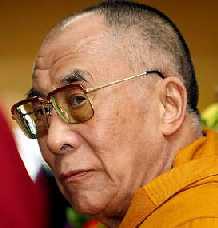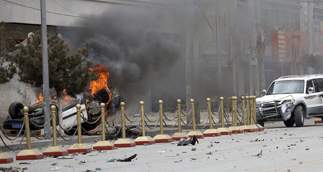|
Tibetan monks (hypocrites) redefine Buddhist pacifism
by nano Friday, Mar 28 2008, 7:52pm
international /
social/political /
commentary
In a purely Buddhist sense there are no others, pluralisms, life-death or binaries of any kind; hence there is no need to fight as there is no one to fight and nothing to fight against! What the world is currently witnessing in Tibet is pure unadulterated religious hypocrisy – Buddhist robes and shaven heads do not a Buddhist make! That should now be obvious to even the most dim-witted Hollywood film stars and western space cadets!

Tibetan monk
Tibetan ‘monks’ have escalated their violent campaign in Lhasa to include burning a Muslim mosque (how tolerant) and torching numerous businesses and other buildings in the capital. Put in plain terms the ‘monks’ have gone on a violent rampage; an orgy of destruction all brought to you by their unquestioned leader, the meat-eating Dalai Fraud -- who also happily accepts gold medals and honours from the world's most heinous liar and mass murderer, George W Bush! A match made in ‘heaven/nirvana’ no doubt. The next time someone mentions religion, cry hypocrite, fraud and reach for your secular pistol! At least that secular act has INTEGRITY!
I have nothing more to add to the following AP report except perhaps to reiterate that (all) religion is poison:
Police Close Muslim Quarter in Lhasa
by Charles Hutzler
LHASA, China (AP) — Police closed off Lhasa's Muslim quarter on Friday, two weeks after Tibetan rioters burned down the city's mosque amid the largest anti-Chinese protests in nearly two decades.
Officers blockaded streets into the area, allowing in only residents and worshippers observing the Muslim day of prayer. A heavy security presence lingered in other parts of Lhasa's old city as cleanup crews waded through the destruction inflicted when days of initially peaceful protests turned deadly on March 14.
Tibetans torched hundreds of buildings and attacked members of China's dominant Han ethnic group and Chinese Muslims known as Hui, who have dominated commerce in the city.
The Dalai Lama, Tibet's exiled spiritual leader, raised concerns Friday that China's portrayal of the protests in Lhasa was fanning the flames of ethnic conflict.
"The state media's portrayal of the recent events in Tibet, using deceit and distorted images, could sow the seeds of racial tension with unpredictable long-term consequences. This is of grave concern to me," he said in a statement from his headquarters in northern India.
The protests were the longest and most-sustained challenge to China's rule in the Himalayan region since 1989. The ensuing crackdown by Chinese authorities has focused international attention on China's human rights record in the run-up to the Olympic Games.
On Friday, President Bush and Australia's new prime minister, Kevin Rudd, urged China's leaders to open a dialogue with the Dalai Lama.
"It is absolutely clear that there are human rights abuses in Tibet. It's clear-cut; we need to be upfront and absolutely straight about what's going on," Rudd told reporters after he met with Bush at the White House.
Urging restraint, Bush said he told Chinese President Hu Jintao this week that "it's in his country's interest" that top Chinese leaders meet with representatives of the Dalai Lama.
Foreign ministers from the European Union's 27 countries met in Slovenia to debate an EU response amid suggestions they consider boycotting the Olympics' opening ceremony to protest Beijing's crackdown in Tibet.
House Speaker Nancy Pelosi, who drew China's ire for her recent visit with the Dalai Lama, said Friday it would be wrong to boycott the Beijing Olympics.
While the Chinese government has failed to live up to its commitment to improve human rights conditions in China and Tibet, "I believe a boycott of the Beijing Olympics would unfairly harm our athletes who have worked so hard to prepare for the competition," she said in a statement.
Apparently in response to the international pressure, China is allowing a group of foreign diplomats to visit Lhasa on Friday and Saturday. A U.S. diplomat will be on that trip, said U.S. Embassy spokeswoman Susan Stevenson. She had no other details.
A small group of foreign journalists, including an Associated Press reporter, was taken to Lhasa on a three-day government-organized trip that ends Friday.
The otherwise tightly scripted visit was disrupted when 30 red-robed monks pushed into a government briefing at the Jokhang Temple Thursday, complaining of a lack of religious freedom and denouncing official claims the Dalai Lama orchestrated the March 14 violence.
"What the government is saying is not true," one monk shouted.
"They killed many people. They killed many people," another monk said, referring to Chinese security forces.
The outburst by the monks lasted for about 15 minutes before government officials ended it and told the journalists it was "time to go."
China has strenuously argued that the widespread arson and looting were criminal acts orchestrated by separatists, while refusing to discuss the root causes of the anger and alienation blamed for sparking the violence.
A vice governor of Tibet, Baima Chilin, later told reporters the monks would not be punished.
However, Tibet activists on Friday voiced concern over possible Chinese government retaliation against the monks.
"There are serious fears for the welfare and whereabouts" of the monks, the International Campaign for Tibet said in a statement.
"The monks' peaceful protest shattered the authorities' plans to convey an image that the situation in Lhasa was under control after recent demonstrations and rioting," it said.
Other than the incident at the Jokhang, one of Tibetan Buddhism's holiest shrines, most of the second day of the tour went according to plan, with officials sticking to the government line that the most violent anti-Chinese protests in nearly two decades were plotted by supporters of the Dalai Lama.
The Dalai Lama has denied the accusations and threatened to resign as head of the India-based Tibetan government-in-exile if the violence continued.
The government says at least 22 people have died in Lhasa; Tibetan rights groups say nearly 140 Tibetans were killed, including 19 in Gansu province.
One of the monks protesting Thursday said the death toll was far higher than the government was saying, but did not give the source of his information.
"The cadres and the army killed more than 100 Tibetans. They arrested more than a thousand," he said.
After the violent 1989 uprising in Lhasa, Tibetans claimed many more Tibetans died than the official toll of 16 because families feared punishment if participants went to hospitals.
Fu Jun, head of the News Affairs Office of the Propaganda Department of the Tibet Communist Party, said Friday the monks were spreading rumors.
"We are keeping an open mind about their complaints. The rumor is misleading the media without a shred of evidence ... We will clear up facts in a few days time when appropriate," Fu said.
The Chinese-installed vice governor of Tibet, Baima Chilin, told the reporters late Thursday that the monks would not be punished for their outburst.
"We will never do anything to them. We will never detain anyone you met on the streets of Lhasa. I don't think any government would do such a thing," he said.
State TV, which has widely covered the foreign journalists' tour, showed the Jokhang visit on its evening newscast, but not the monks' outburst.
Journalists were taken Friday morning to interview members of the Communist Party-run Buddhist Association, who reiterated standard Chinese accusations against the Dalai Lama.
"This was premeditated," said Drubkang, a reincarnated lama and member of Beijing's top government advisory body, who like many Tibetans uses just one name.
© 2008 The Associated Press

Lhasa
http://ap.google.com/article/ALeqM5h5Z6bJwtN_roGSIUQiQnfbf2NkhgD8VMIV8O0
<< back to stories
|